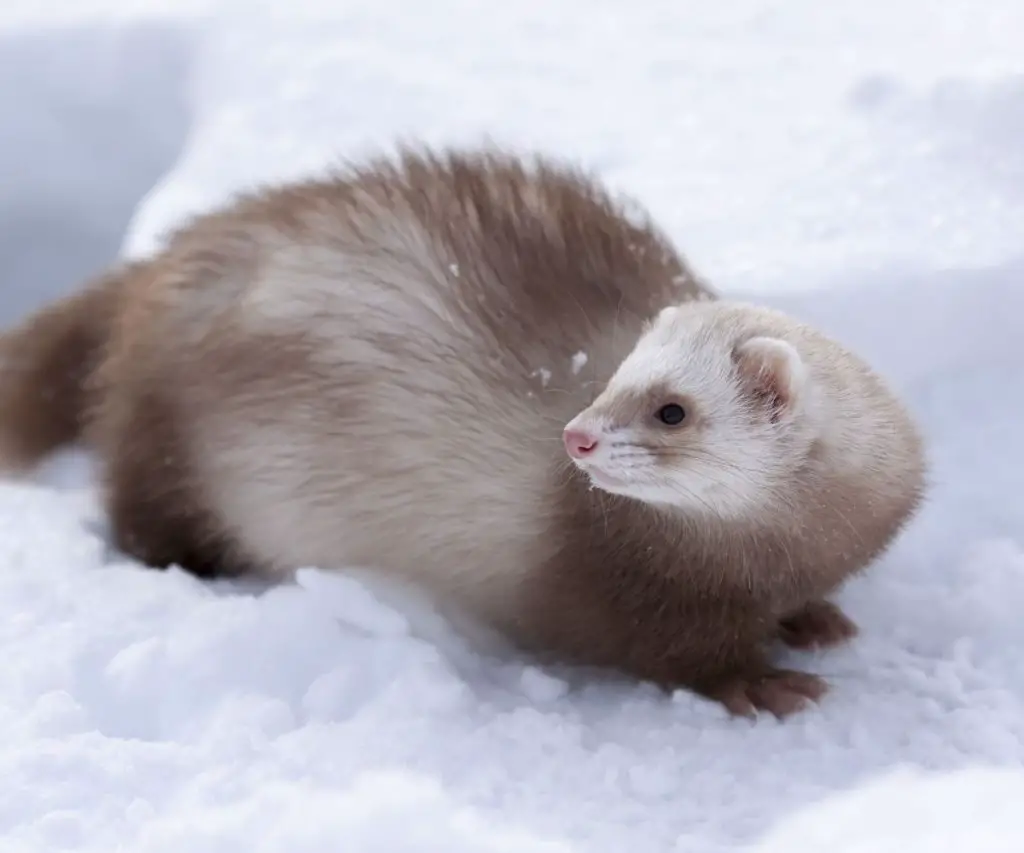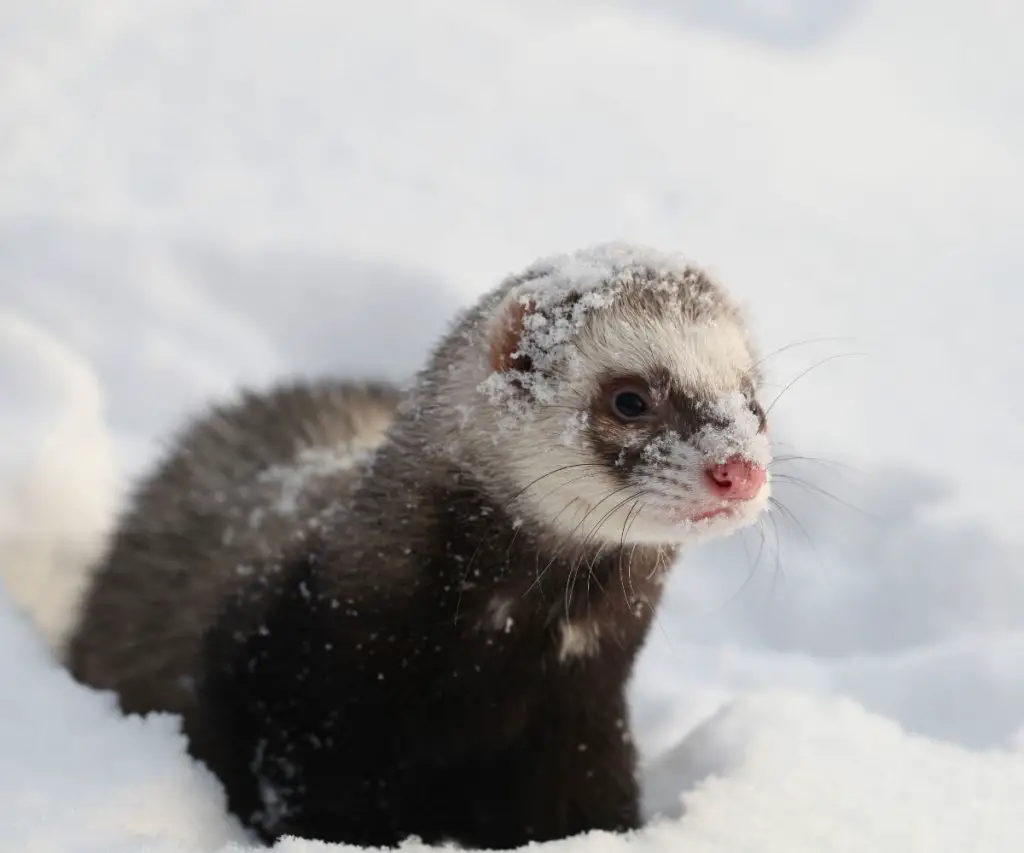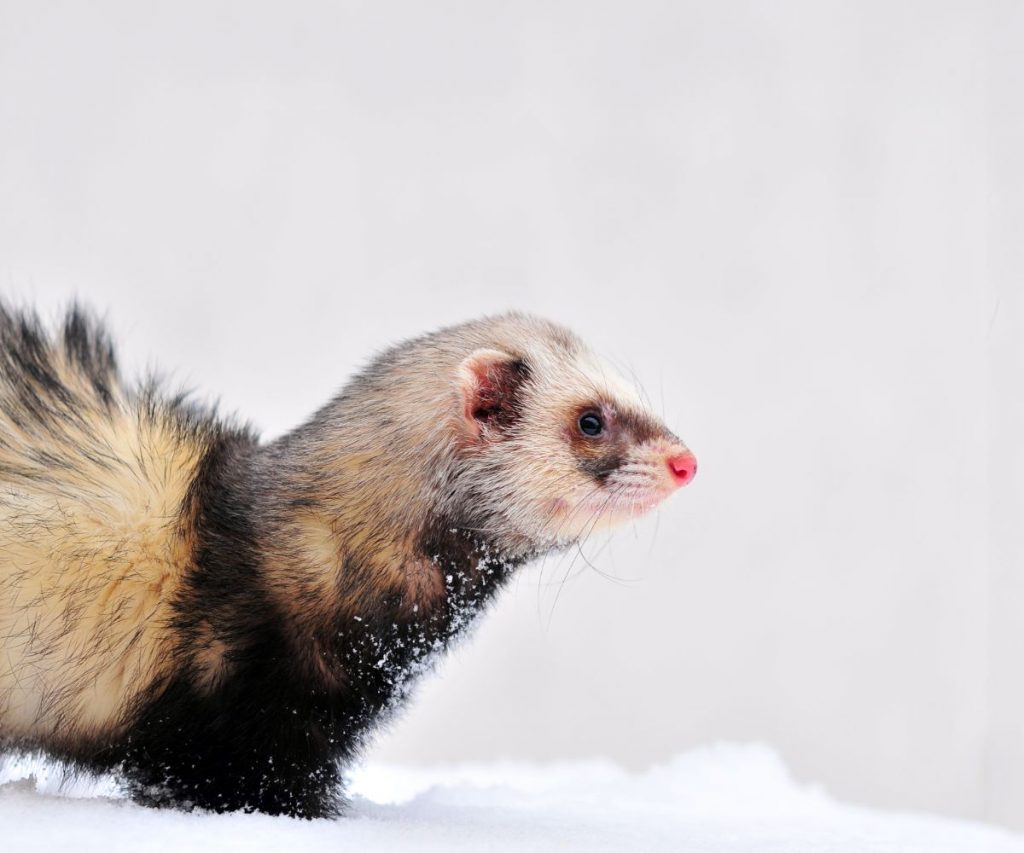Ferrets originated from the European polecat, and many wild ferrets live in Canada. So, if you’re wondering, “Can ferrets withstand cold?” they absolutely can.
Before you take your ferret out in the snow to play, though, there are some items you should keep in mind. Read on to learn about when cold weather temperatures are healthy for ferrets.
Can Ferrets Withstand Cold?
Ferrets are cold-weather animals that thrive in temperatures as low as 32 degrees Fahrenheit as long as they have a dry environment and bedding to burrow in. They have a naturally thick coat that prevents them from getting too cold.

Can You Take Ferrets Out in the Snow?
Yes, you can take your ferret out in the snow. In fact, your ferret will love frolicking and borrowing in the snow. However, you should only allow them to play in the snow for 15–20 minutes to prevent them from getting too cold.
Ferrets have a thick layer of fur that insulates them from the cold, much like winter jackets do for humans. Also, they may puff up their tail and fur to increase the warming ait pockets between the skin and the fur.
When playing with your ferret in the snow, it’s best to keep them on a leash. That way, they won’t be able to burrow out of your sight.
Can Ferrets be in Snow?
Ferrets can be in the snow, as they naturally live in cold climates in the wild.
There are few situations in which you shouldn’t let your ferret play in the snow, though. They include:
- Baby ferrets
- Ferrets with health conditions
- Elderly ferrets
Elderly ferrets, in particular, tend to lose fur as they get older, causing them to have less insulation.

Do Ferrets Get Cold Easily?
Ferrets don’t get cold easily because they have a thick layer of fur that protects them from inclement weather. Furthermore, they live in cold weather areas in the wild.
If your ferrets are in conditions under 32 degrees Fahrenheit, they will start to feel cold.
Furthermore, you need to consider wind chill; if the temperature is 37 degrees, but the wind chill makes it feel like 30, your ferret will likely feel uncomfortable and might even suffer from hypothermia.

What Happens if a Ferret Gets Too Cold?
If ferrets get too cold, they could experience hypothermia, which is when they quickly lose their body heat. During this time, their bodies go into a shocked state. They also might begin getting frostbite, especially in areas where they don’t have fur, like on their paw pads and nose.
Before hypothermia sets in, there are other signs you can watch out for that indicate your ferret is suffering from the cold. They include:
- Shivering
- Dry skin
- Dehydration
Dehydration is a widespread issue for ferrets in cold weather. That’s because the air is dry, and your ferret will likely be expending a lot of energy playing.
If you notice your ferret’s skin beginning to dry out, you should stop taking them outside in the cold until it heals. Otherwise, you run a higher risk of your ferret getting a skin infection.
Can Ferrets Stay Outside in Winter?
You can leave your ferret outside in the winter as long as you provide them with proper shelter. That includes many dry blankets that they can burrow in, protection from wind, and a blanket over their cage if the temperature drops below 32 degrees Fahrenheit.
Hypothermia can set in if your ferret isn’t able to escape the elements. Although ferrets can withstand the cold, they prefer temperatures in the 60s.
So, it’s best to accompany your ferret on a leash outside in the winter. That way, they can play in the snow before you bring them to milder temperatures inside.

What Temperature is Too Cold for Ferrets?
Any temperature below 32 degrees Fahrenheit is too cold for ferrets. If you expose your ferrets to cold temperatures and they don’t have the means to escape to shelter, they could die.
In the wild, ferrets may not leave their burrow for up to one week in the winter. Although wild ferrets typically consume less food in the winter, they gain more weight because of decreased activity.
So, you may notice that your ferret gains weight in the winter if you keep their cage in a cooler climate, and they become less active during playtime.
Dampness and wind can make cold temperatures even more uncomfortable for your ferrets. For this reason, if you keep their cage in a cold environment, you should ensure they always have access to dry bedding and shelter from the wind.
How Cold Can Ferrets Live in?
Ferrets can live in temperatures as low as 32 degrees Fahrenheit. If the temperature drops below 32 degrees, they’ll need plenty of blankets and shelter to prevent them from freezing to death.
You can also use cozy hammocks such as Vedem’s ferret hammock. It has multiple entrances for your ferret to escape cold temperatures. In addition, the plush fabric will cradle their body, helping them to stay warm.
Since ferrets in the wild live in northern regions such as Canada, they can survive in sub-zero temperatures. The difference is that they burrow in the ground, though.
So, since a ferret’s cage doesn’t mimic a ferret’s natural environment, you should never place their cage in a place that gets colder than 32 degrees.
What Temperature Should Ferrets Be Kept in?
You should keep your ferret in temperatures between 59–70 degrees Fahrenheit. Once temperatures reach close to 80 degrees, your ferret will start feeling uncomfortable.
Temperatures of 90 degrees Fahrenheit and higher are deadly to your ferret.
Another item to consider aside from the temperature is the humidity. Ferrets can’t sweat, so they expel heat through their feet, mouths, ears, and noses. The more humid an environment is, the more difficult it is for your ferret to use these natural cooling mechanisms.
Therefore, if you live in a hot and humid climate, ensuring your ferret is in the vicinity of an air conditioner and dehumidifier is crucial.
Do Ferrets Enjoy Cold Weather?
If you want to take your ferret outside to play in the snow, you no doubt want to know, “Can ferrets withstand cold?”
Thanks to their thick coat, ferrets enjoy the cold weather as long as the temperature doesn’t drop below 32 degrees Fahrenheit.

